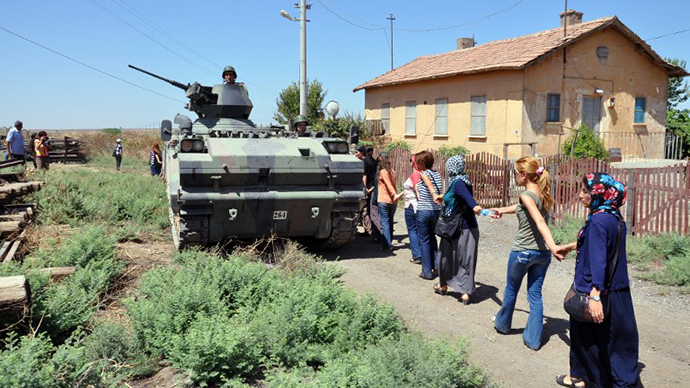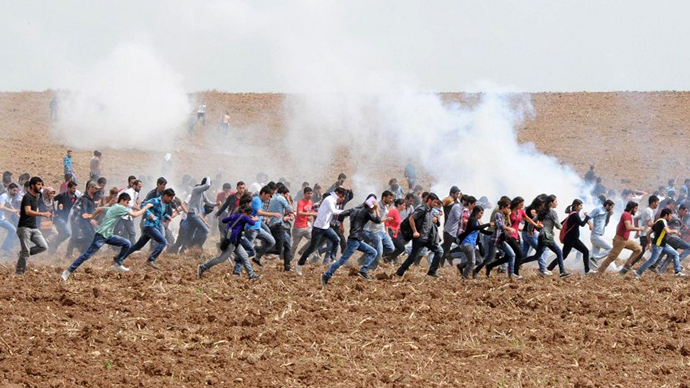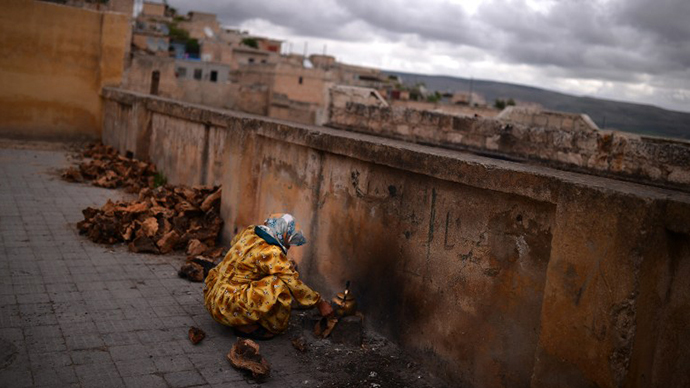Turkey’s support for Syrian rebels in Kurd killings may backfire

Turkey is interested in destabilizing the situation in the Kurdish-populated areas in Syria, but its support of radical Islamists may lead to violence spilling to the Turkish territories, Kurdish and international experts told RT.
Tuesday’s unconfirmed report of 450 Kurdish deaths was
accompanied by grisly footage of the massacre that took place in
a region bordered on one side by an expanding Al-Qaeda, and on
the other by Turkey – one of the staunchest opponents of Kurdish
independence.
The alleged atrocities were condemned by Russian Foreign Minister
Sergey Lavrov, who urged the UN Security Council to put more
effort into convincing Syrians to stop fighting each other and
join forces to expel foreign terrorists from the country.
The Islamist attacks on Kurdish territories have become frequent
in recent months, Hassan Muhammad, a representative of the
Kurdish Democratic Union in Europe told RT.
“This is a planned campaign, and the militia is now blockading
the Kurdish area,” he said. “It’s the worst in Ain
Al-arab, which is surrounded by the Turkish border and, from
three other sides, by terrorist battalions like Jabhat Al-Nusra
and the Islamic state of Iraq and the Levant. We confirmed that
terrorists have arrested hundreds of people, especially in Tel
Hasel and Tel Aran, and there are still hundreds of people
missing. Families, who reached us from Afreen told us about those
crimes… those crimes are against humanity, and punishment must
take place by international law.”
All that is happening, Hassan says, is not without the
participation of “regional forces, especially Turkey… helping
militants logistically and [opening] cross-border points for them
to infiltrate Kurdish areas.”
Manuel Ochsenreiter, a German journalist covering Syria, says
that “we have information from the Kurdish Popular Defense
units who claim that [Al-]Nusra Front is also supported by
Turkish intelligence – and I think this is not a coincidence when
we know how Kurds are treated in Turkey.”

The Kurdish Democratic Union Party has sent a letter to the
European Union with an appeal to step in and do something about
the growing Islamist danger that threatens to engulf the entire
country in its pursuit of supremacy.
“We call on the forces of goodness and peace and all lovers of
democracy and freedom to cooperate with the Kurdish people to
face this Salafi terrorist expansion in Syria generally, and in
Kurdish areas specifically, and allow not to implement plans of
establishing an Islamic Emirate with support of regional powers
surrounding Syria, because that threatens not only the Kurdish
Syrian people, but also international peace and security,”
the letter said.
But Ochsenreiter believes that international condemnation and
support will be limited and only issued in verbal form because,
among other reasons, “Turkey is a very important NATO
member.”
However, he does not share the view that ethnic cleansing of the
Kurds is a grand objective of the operation. Instead, he claims
that it is all for the most part a fight over spheres of
influence in a very unstable country.
Turkey ‘realizing they need to act quickly’
Turkey, along with the Free Syrian Army and Islamic extremist
groups, is making a concerted effort to push the Kurds into a
more active role in the conflict from, which they had previously
shied away, Karin Leukefeld, also a journalist who has just
returned from Damascus, believes.
In doing so, they would also put at risk the Kurdish control of
oil fields – an ownership that neither the Islamic extremists nor
the outside actors are particularly thrilled about, he explained.
The escalation of violence in the Kurdish area in the northern
part of Syria “doesn’t look good on Turkey,” Kurdish
blogger and Middle East political risk analyst, Schwan Zulal,
said.
“Slowly the Turkish government is realizing that they need to act
quickly and swiftly and come in and try limiting these groups’
power in these areas,” he stressed. “Let’s not forget
about Iran in this equation, because Iran is very happy to revive
the PKK [Kurdistan Workers' Party] which is very close to PYD
[Kurdish Democratic Union Party]. The uncertainty on the Turkish
border can easily spill into Turkey and destabilize that
area.”
“The picture is becoming very complex and it’s almost like a
proxy war inside another proxy war is being fought in the area
between one side east and west and on the other side between Iran
and Turkey,” he added.

The plans of Al-Qaeda-linked rebels to establish an Islamic state
on the Kurdish territories will never be fulfilled without the
backing from “Saudi Arabia, Qatar, Bahrain and the other Gulf
monarchs, including the Western states - the US, France and
Britain,” an anti-war activist at the Answer Coalition,
Richard Becker, believes.
“If they succeed in carving out a state in northern Syria,
through which armaments could flow freely from Turkey and then
the US can fly an armament to support these Jihadists then, it
would prolong the massacre that is going on in Syria and this is
what the Gulf States want to do,” he explained.
US ‘supporting Al-Qaeda-linked Jihadists massacring the people’
When RT asked State Department spokeswoman Jen Psaki, she had
little to say, only repeating that the US “would always be
concerned with any reports of attacks on civilians or any others
of this kind.”
Becker claims the US foreign policy in the Middle East is
currently dictated by “Senator John McCain and Saudi
Arabia,” with main stream media leaving the American people
in the dark on the real state of things in the region.
“Right now most of the Americans are very unclear about
exactly what is going on,” he said. “Our media is keeping
it on the down low on one hand, and on the other hand is saying
that we are supporting moderate democratic opposition, which
hilarious to anybody who is following this. We are supporting
Al-Qaeda-linked Jihadists who are massacring the people.”
Western support for the Islamist extremists in the Middle East
may lead to a global disaster, Lawrence Freeman, editor of the
Executive Intelligence Review Magazine, warned.
“Through the overthrow of Gaddafi in Libya, to Syria, we’ve
been supporting Al-Qaeda – the very people who attacked the
United States… The entire Syria is a [cesspit] that spreads from
North Africa all the way to the Gulf that could bring us to a new
world war if we don’t stop Obama’s and Cameron’s policies,”
he said.
The Kurds are one of the biggest ethnic groups in the world,
which doesn’t have a national state of their own, with about 30
million people inhabiting a region known as Kurdistan, which
includes adjacent parts of Iran, Iraq, Syria and Turkey.
They have enjoyed partial autonomy in Iraqi Kurdistan since 1991,
while the push for creation of a Kurdish autonomy or a state in
other Kurdish-populated countries resulting in countermeasures by
the respective local governments.
The statements, views and opinions expressed in this column are solely those of the author and do not necessarily represent those of RT.
The statements, views and opinions expressed in this column are solely those of the author and do not necessarily represent those of RT.












